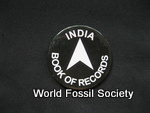Australian builders have uncovered a rare trove of crocodile, frog, fish and plant fossils, in what could be a world-first.

The fossils, trapped in a layer of oil shale, were found during excavation works near Brisbane’s Geebung railway station at a depth of about 15 metres (49ft).
The bones have been identified as coming from ancient crocodiles, as well as other significant material including fish, freshwater shells and plant impressions.

They are thought to be about 50 million years old.
The find – a significant insight into how animals and plants evolved after the extinction of dinosaurs – has been described as a “potential world-first”.

Queensland Museum chief executive Suzanne Miller told Australia’s Ten News: “In the whole of north Australia this is absolutely unique, and dependent on what we find, because we are just at the beginning of this project, this could be unique in the world.
“These could be some of the earliest mammals ever found.”

Geoscientists are currently examining the fossils.
Ms Miller added: “Very few sites of this age are available for study, as similar-aged sites in the greater Brisbane area are often no longer accessible due to housing and urban development.

“The construction works have fortuitously provided access to a new locality that was not previously known to palaeontologists.”
Queensland transport minister Scott Emerson said it was an “extraordinary finding in Brisbane’s backyard” and the area would be combed for further specimens.

“The fossils will provide a valuable opportunity for more detailed studies,” Mr Emerson said, adding that experts were interested in retrieving any other fossils that could be in the same area.
Queensland has some of Australia’s richest fossil deposits, including a famous dinosaur dig at Winton in the west of the state, where three new dinosaur species were discovered in 2009.
Brisbane is Australia’s third largest city, with a population of 2.2 million.



 July 19th, 2013
July 19th, 2013  Riffin
Riffin  Posted in
Posted in  Tags:
Tags: 